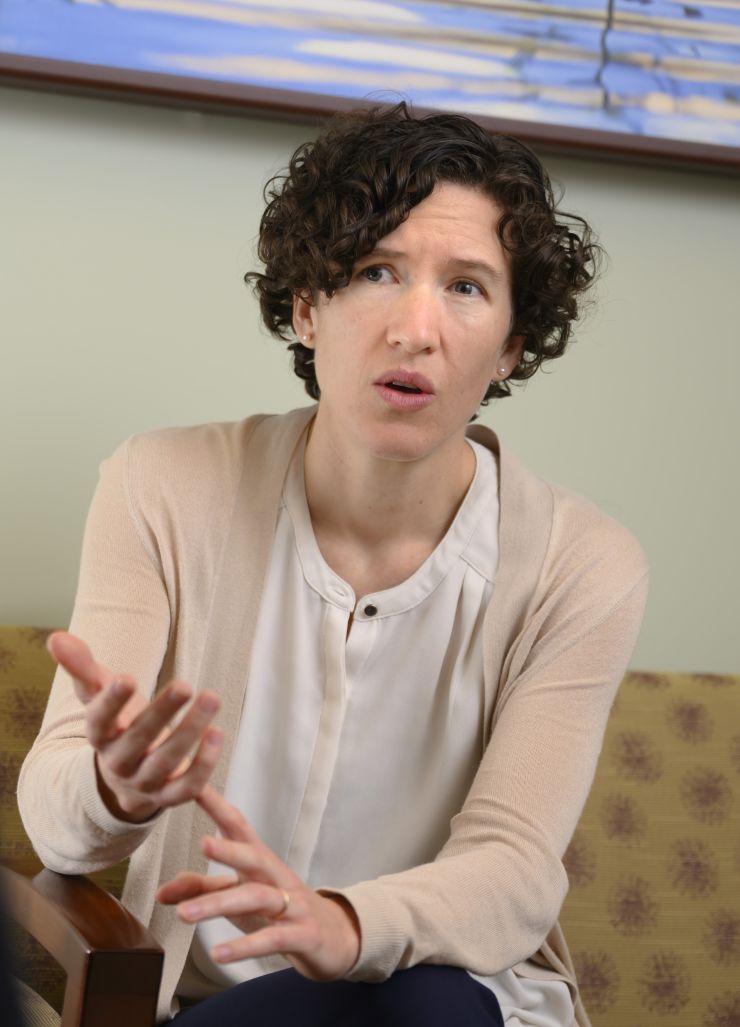
The Women's Mental Health Track is a comprehensive curriculum in preparing future women's mental health experts with broad clinical experience. The track will expand on the existing women's mental health curriculum and training that all psychiatry residents receive and will provide a more comprehensive, in-depth exploration of the exciting field of women's mental health through clinical rotations, mentorship, teaching, and scholarship.
Goals
The Women's Mental Health Track aims to prepare leaders in the field of women's mental health and reproductive psychiatry who are able to:
- Provide high-quality psychiatric care to women across the reproductive lifespan, including preconception, pregnancy, postpartum, lactation, and menopause
- Serve as educators to peers in psychiatry, pediatrics, obstetrics, psychology, and other related fields regarding perinatal mental health and psychoneuroendocrinology
- Critically appraise literature pertinent to the field and contribute their own scholarly work
Core Curriculum
Clinical rotations:
- PGY3: Goal for half of outpatient clinic to have WMH focus. Options include:
- BT OB-Psych Clinic (Smith)
- BT MPAT clinic (Ojeda)
- TCH Northwest Clinic (Doghor)
- TCH PFW
- The Women's Home
- VA Women’s Mental Health (Skalany)
- PGY4
- 4-6 months at The Women's Place clinic
Academic activities:
- Academic Project or scholarly work related to the field of women's mental health
- Attendance and presentation at monthly reproductive psychiatry journal club
- Lecture to psychiatry residents on perinatal psychiatry
Mentorship:
- Regular meetings with track director for self-assessment, identification of goals, and evaluation of progress on scholarly activity
Selection Process:
Applications to the WMH track are solicited in the fall of each year. Those interested in joining the track will submit their CV and a brief essay and may be asked to interview depending on number of applications received. The track can currently accommodate up to two residents per year.
Track Residents

"The Women’s Mental Health track is a very unique opportunity that the Baylor Psychiatry Residency program provides for residents interested in learning how to diagnose and treat psychiatric illness across all stages of the reproductive cycle. Most recent NIH data suggests that females are more likely to suffer from any mental illness and exceedingly more likely to seek care. As such, the field of psychiatry is moving toward more targeted care of women through integration of their medical and psychiatric needs.
I am so grateful to be a part of a program where I can work with experts in the field of reproductive psychiatry to build my confidence in treating women struggling through menarche, infertility, pregnancy, and menopause. This includes ample opportunities to treat and advocate for a very disadvantaged population, as women of color are more likely to be victims of domestic violence, human trafficking, adverse pregnancy outcomes, and both early onset and more severe symptoms of menarche and menopause. I look forward to targeting my practice toward more holistic psychiatric care of women, and I am confident that Baylor will help me do just that!"

2022-2025
"I am so thrilled to be part of the Women’s Mental Health track at Baylor College of Medicine. I chose this track because of my interest in both perinatal and perimenopausal psychiatric disorders. This track is longitudinal throughout the four years of residency and thus far I have truly enjoyed working with female veterans through our VA hospital helping take care of both their primary care and mental health needs. In PGY2 I have the privilege of doing both psychotherapy and inpatient psychiatry rotations with that continue to supplement knowledge and help me grow in the field of reproductive psychiatry with opportunities to do research and QI projects on the track."

"I am excited to be joining the Women’s Mental Health Track. This opportunity will equip me with the training needed to provide excellent and evidence-based care for women with psychiatric disorders during pregnancy, postpartum, infertility, menopause, breastfeeding, and more. Reproductive Psychiatry is a unique sub-specialty that liaisons between OBGYN and psychiatry, that also provides the opportunity to educate patients and other providers. The multiple rotations and clinics I will participate in during my residency training, the many opportunities for mentorship, and the in-depth exploration of women’s mental health will give me the experience needed to be confident in my knowledge after residency. I am dedicated to pursuing a career in reproductive psychiatry, and I am certain that the Women’s Mental Health Track can help me achieve this goal."

"I am so grateful to join the Women’s Mental Health track here at Baylor. It is a privilege to care for the women of our Houston community and have reproductive psychiatry education integrated into all four years of residency training. We are lucky to have numerous renowned reproductive psychiatry faculty who provide us with longitudinal mentorship. I am interested in peripartum and perimenopausal mood disorders, disorders of female sexual dysfunction, and substance use disorders in pregnancy, and here at Baylor, we have faculty specializing in each of these areas. I am confident that the WMH track will allow me to gain confidence in the diagnosis and management of various psychiatric illnesses across the reproductive lifespan so that after residency, I can specialize fully in the psychiatric care of women."

"I am elated to join the Women’s Mental Health Track within the Baylor College of Medicine Psychiatry Residency Program. Through my volunteer and clinical endeavors in shelters and women’s health clinics, I have found fulfillment in caring for women at all stages of life. These experiences have fueled my passion for trauma-informed care, the postpartum period, and reproductive endocrinology and infertility. The Women’s Mental Health Track offers invaluable opportunities to deepen my expertise in psychopharmacology during the pregnant, postpartum, and perimenopausal states. I look forward to gaining a deeper understanding of the social determinants of health and collaborating with colleagues in other specialties, reciprocally learning from and providing education to others regarding the intricacies of women's mental health care. The resources, mentorship, and clinical opportunities provided by the track will enable me to achieve my aspirations of providing comprehensive, patient-centered care to the women of Houston as I pursue a career in Reproductive Psychiatry."








